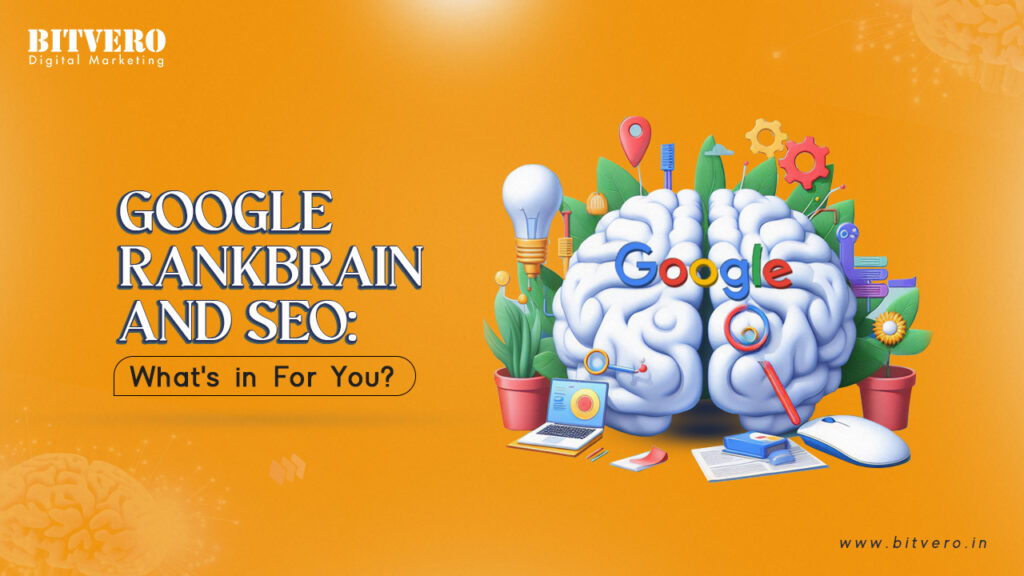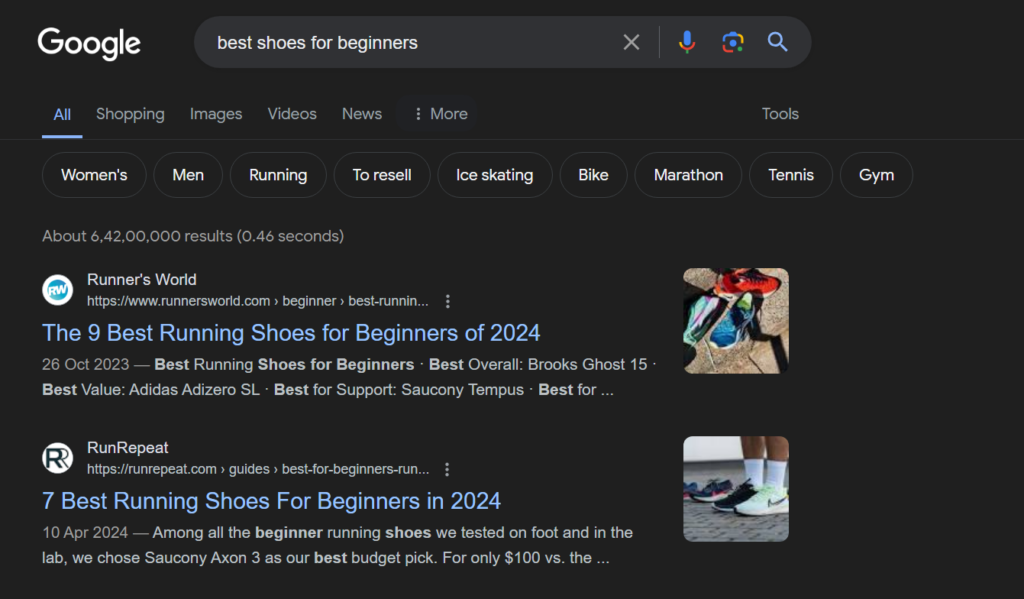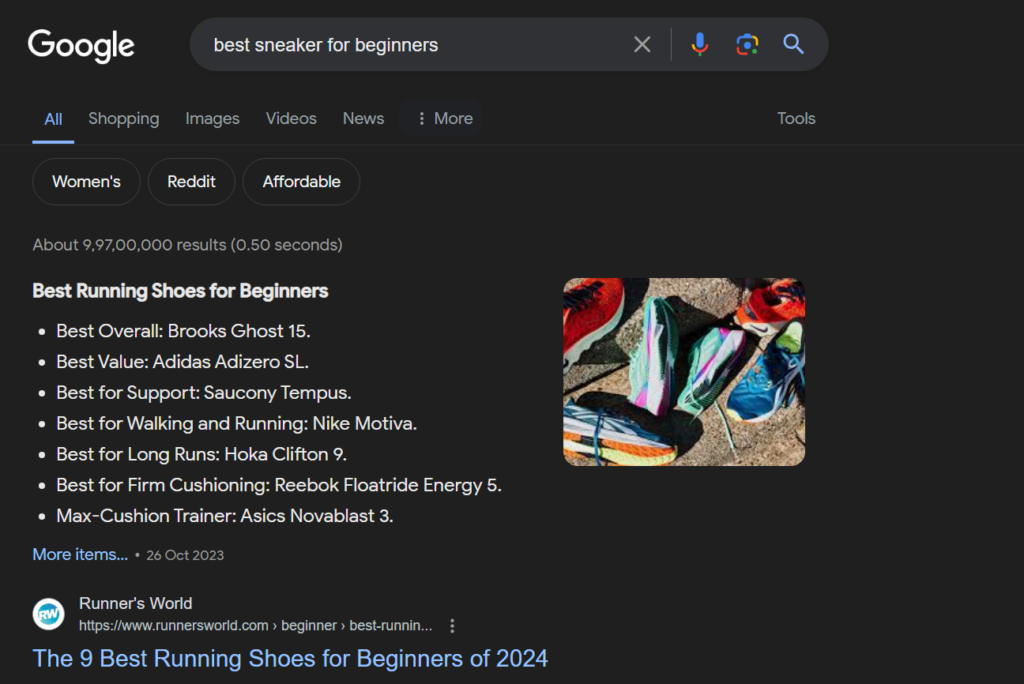Google RankBrain and SEO: What’s in For You?

Are you someone looking to know the connection between Google RankBrain and SEO?
Or are you even the one searching for “what it Google RankBrain?”
If the answer to both of them is yes then you are at the right place.
This article will provide the needed information about RankBrain like what it is and how it functions and also what Google RankBrain has to do with your search rankings.
Let’s start!
What is Google RankBrain?
Google Rank Brain is an AI model that Google introduced in 2015.
The purpose was to help Google understand the query’s meaning and intent. Particularly those that were ambiguous or complex.
Before RankBrain, Google relied on keyword matching rather than understanding the semantic meaning to answer search phrases.
That means that for a given query, Google would extract the indexed pages for each individual word rather than attempting to understand it as a whole.
For example, if we were to type “Red cotton T-shirt,” Google would not take it as meaning that I need a T-shirt that is red in colour and made of cotton fabric.
Instead, it scans pages indexed that contain even one keyword of my query—“red,” “cotton,” and “T-shirt—all in their individual form.
Now, the results that Google brought me were not quite relevant, as it has dumped unnecessary stuff into my search results.
Similarly, if a word in the query was misspelt, Google had nothing to show in the results- unless any page on the internet has been indexed with the same misspelling.
For example, if you typed “pziza”, the response was like “, Sorry, we found nothing to match your query”.
Basically, Google lacked the ability to understand the query as a whole—that is, the flow and structure of it, as well as the intent behind it.
Google saw this as a major drawback that needed to be addressed.
After working on it, the final product that Google introduced to overcome its inability to understand the query intent and provide relevant results was called Google RankBrain.
Read Also: SGE: a new way to search for information by Google
Why did Google introduce RankBrain?
To understand the meaning or intent of the query and to process the 15% of queries that Google gets on a daily basis which are kind of never seen before the mean they sound so new to Google that it does not know what they mean.
Read also: Will Google Penalize AI Content: What is EEAT in Google’s Algorithm?
How does Google RankBrain Work?
Well, the working of it is quite complex and yet simple.
To function, Google Rank Brain relies on two AI branches, NLP and machine learning.
- Natural Language Processing: helps it understand human language.
- Machine Learning: helps understand human behaviour.
NLP helps understand the whole idea behind a query, digging deeper into the meaning, context, synonyms, and intent.
For example, if a query says “ best shoes for beginners.” the algorithm is smart enough to know that it actually aims to ask for recommendations and not general information.

So, the results that appear are web pages suggesting shoes that beginners should consider.
Even if the query used the word sneaker in place of shoes, the search results almost remain the same.

On the other hand, using machine learning, RankBrain analyses search patterns. It collects search data of users in vast amounts and observes how a user behaves to search terms.
That means if in the past a specific webpage got so many clicks for a specific query, Google Rank brain notes down that they both have a connection or are somehow relevant to each other
To do so, RankBrain has two criteria- clicks and dwell time.
Clicks mean the number of clicks a webpage gets.
Dwell time meaning after clicking how long a user stayed on the page
If both CTR and dwell time are good, Rankbrain will consider the page relevant to the search query.
However, they are not the only factors that RankBrain considers. There are hundreds of such factors that work, including location, device type, search history, and even time of day.
Read also: Can AI Content Rank on Google?
How does Google RankBrain impact SEO?
Before you know how RankBrain impacts SEO, let me tell you that this is not a single algorithm that Google uses for ranking factors.
Google has hundreds of such algorithms. So, while responding to a query, they all come onto the scene.
As said, RankBrain is not a ranking signal algorithm in itself. Instead, it works to control the other raking signals and decide how much weightage should be given to which raking signal to rank a web page.
Yes, RankBrain indeed considers dwell time and clicks, as discussed previously. Along with that, it also checks if your content goes well with the parameters already set for other algorithms like quality content, background quality, Local SEO, technical SEO, UX, etc. Et.
So now, if you still have a question about how to optimise for Google RankBrain.
The answer is that you don’t need to do SEO for RankBank specifically. If your webpage complies with all the existing algorithms and follows ethical SEO practices, RankBrain will automatically place your page in search rankings.
However, that depends on how much weight RankBrains gives to different ranking signals based on query intent, demand, and nature.
For example, if the query is meant to get urgent information, the CIS ranking signal is given more weightage, and similarly, if the query demands fresh information, the content freshness ranking factor is applied.
These are to name a few RankBrain works in coordination with many of Google’s ranking factors.
I hope you find the article helpful. If you are struggling with Google search rankings or are looking for SEO expert help, you can talk to our SEO consultant.
Or, if you are looking for full-fledged SEO services in London, here you can find our packages. To discuss this further, call us on
